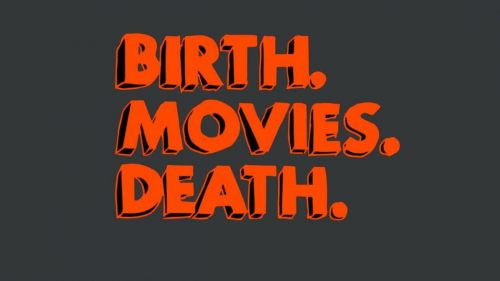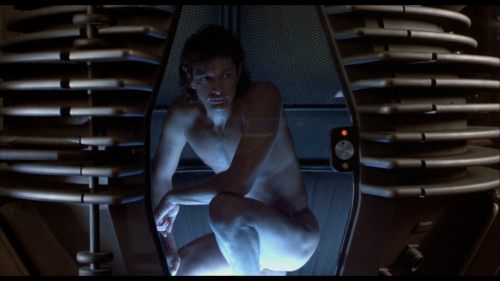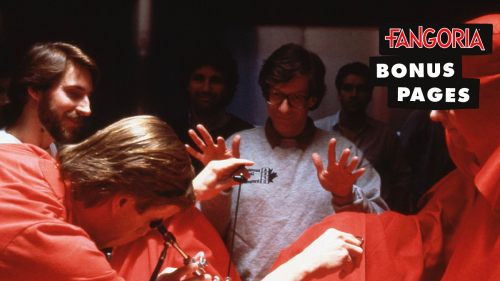I’ll Hurt You If You Stay: Transforming Love In THE FLY
David Cronenberg has often said his preoccupation with physical transformation -- that infamous “body horror” woven through just about every film he made between 1970 and 1986 -- is really about the nature of identity, the end result of an atheist filmmaker trying to reconcile the intellectual self with the physical self. Who am I? Am I the same person I was ten years ago? Who will I be ten years from now? Our cells are completely replenished every seven years; in a very real sense we are several beings removed from the people we were 25 years ago. So what makes us “us”? Where religion provides a tidy answer, Cronenberg has been turning the question over in his mind for decades, each film an approach from another angle.
Certainly this theme of “how much do I change before I cease to be myself” is easy to spot: the characters in Shivers succumb to parasites which erase everything in the host but their libidos; a blood infection in Rabid turns an entire city into homicidal maniacs, bereft of individuality; the protagonist of Scanners ends the film in another body altogether. After Cronenberg eventually abandoned the “goop,” as he calls it, he continued to confront the question of identity. If a mob hit man reinvents himself as a small-town coffee shop owner, and lives that life for enough years (A History Of Violence), is he still a mob hit man inside? To what degree is he defined by the external vs. the internal? If a cop pretends to be a Russian gangster, lives as a Russian gangster and does the things a Russian gangster does (Eastern Promises), isn’t that in fact what he is? If I pretend to be someone long enough, who’s to say I can’t, eventually, really become that person? The same question, with less Karo syrup and bladder effects.
But before he finally transcended the blood and gore and emerged as a kind of Cronenberg 2.0, the director gave us 1986’s The Fly, his horrifying, heartbreaking body horror swan song. The Fly deals with Cronenberg’s career-long conundrum from a unique, emotional angle; while his protagonist is running through his arc of transformation, Cronenberg is also examining the nightmarish journey of what it’s like to be in love with someone who is slowly becoming someone else. And often overlooked in the wake of Jeff Goldblum’s amazing performance as Seth Brundle is Geena Davis’ layered, nuanced turn as Veronica Quaife. In a tight 90 minutes, Davis delivers as thorough a relationship arc as you’re likely to find, touching on themes of new love, betrayal, domestic violence, abortion issues and the assisted suicide of a life partner. It’s an incredible performance, and much more complex than was often credited upon release.
The Fly was released during what was more or less the height of AIDS awareness. It was inevitable that the film, with its imagery of a sexually-awakened protagonist devolving into a mass of cancerous cells, would draw comparisons to the headline-grabbing epidemic of the time. David Cronenberg has always resisted that comparison. By 1986, sex and death had been his professional palette for over a decade; he was not a topical filmmaker, he argued. Rather, The Fly is about dealing with death, and what Cronenberg calls the real “original sin: the knowledge of your own finite existence.” Confronting death is arguably at the core of all horror films. But The Fly offers a more harrowing experience, in that it’s about confronting the death of someone you love. After all, we can ponder our own death, but we cannot know it. The death of someone we love is unbearably real, and that’s part of what makes The Fly resonate so hard nearly 30 years after its release.
In Veronica’s reaction to the slow death of Seth, we see echoes of the very human “pre-grief” process, an emotional touchstone for anyone who’s had to witness the person they love losing their dignity, their faculties, even their basic bodily functions as death looms. For a film hinged on a far-out premise of matter teleportation and gene-splicing, the emotions are all too familiar: Veronica begs Seth to seek help, to please go to a doctor. She watches with sympathy, with pity and even with impatience and exhaustion as Seth’s mind races between despair and mania, trying to make sense of what’s happening to him. In the wake of the film’s finale, Seth’s “help me” becomes a plea for euthanasia. Veronica’s mournful sobs as the film fades to black are not typical horror movie tears; they feel more akin to those from any graveside funeral we’ve been to. How amazingly far Geena Davis’ performance is from the “scream queen” role a lesser film - and a lesser actor - might have delivered.
But what’s most remarkable about the relationship subtext is the subtler stuff. The big themes of dying and decay in The Fly get the lion’s share of critical attention, but the film has smaller, yet no less relatable, moments which speak to a different kind of death. The confusion and hurt in Veronica’s eyes as Seth rages at her out of nowhere, the threat of violence hanging in the air as he punches the walls, is a resonant, terribly real moment. The prolonged silence that follows an explosive argument, broken by a panicked phone call (“I’ve been afraid to see you. Now I’m afraid not to”), resonates to anyone who’s endured the back-and-forth death throes of a relationship. The amazing “insect politics” scene (“I’ll hurt you if you stay”) isn’t heartbreaking because Goldblum is covered in fly hairs and 50 pounds of foam latex tumors. It’s a tear-inducing moment because we’ve all perhaps once loved someone who, little by little, atom by atom, became someone else over time. It likely happened much more slowly and involved significantly less gore, but it was every bit as complete as Seth Brundle’s transformation, and one which both sides were powerless to stop. The emotional, human core of The Fly is about more than physical death. It’s about Veronica struggling to reconcile her feelings with the reality that the person she loves isn’t that person anymore. Logic tells her she “knows” who the individual standing in front of her is, but the being with whom she’s in love no longer exists. In the end, that’s maybe the least sci-fi concept in the world.
This was originally published in the March issue of Birth.Movies.Death. The Fly screens at the Alamo Drafthouse this month.



